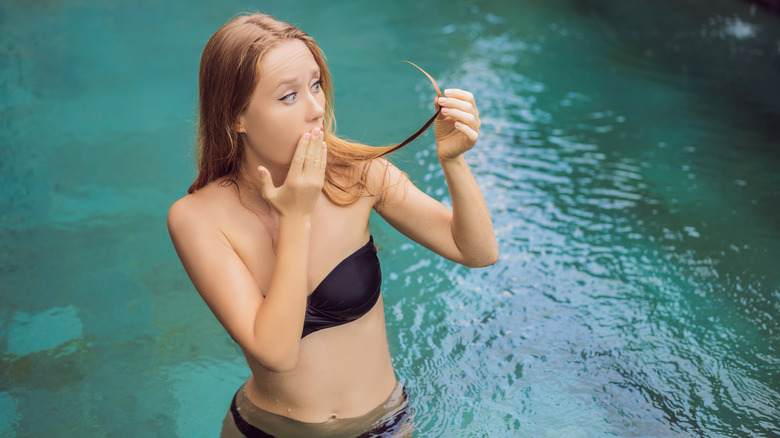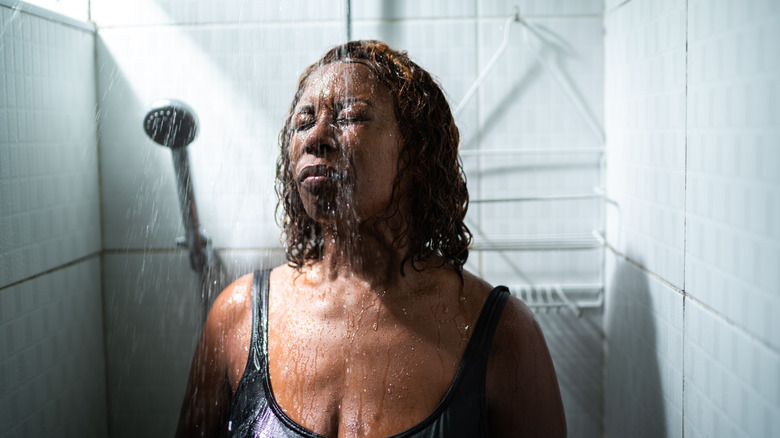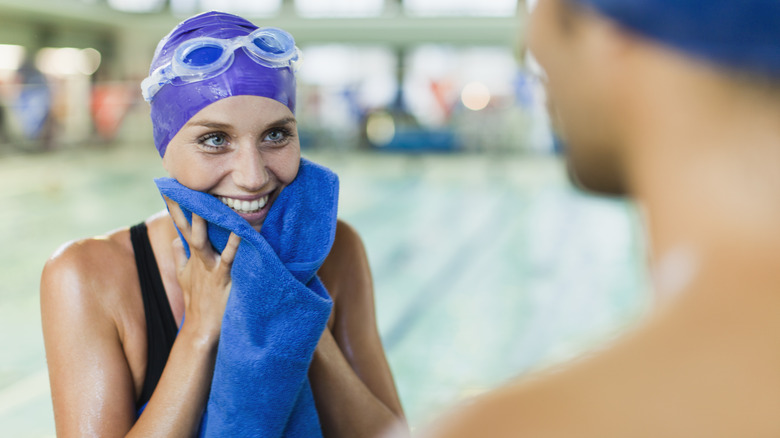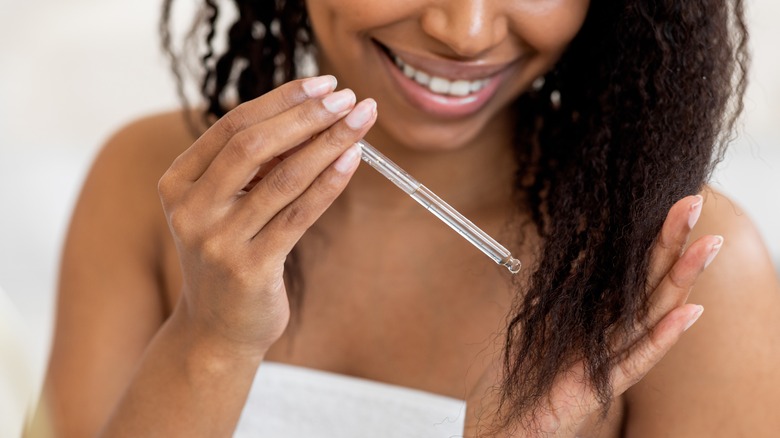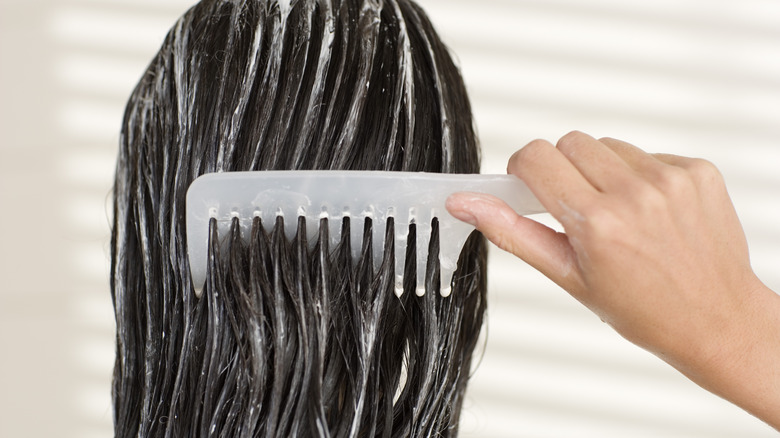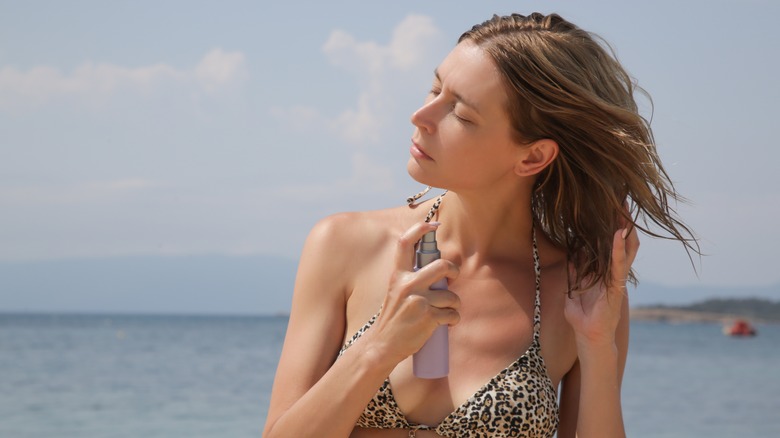Simple Tips That Will Protect Your Hair From Harsh Chlorine Pools
With summer in full swing, you may be tempted to spend most of your days chilling by or in the swimming pool. Few things are more relaxing than parking yourself poolside with a book in one hand, and perhaps taking quick dips into the crystal-clear blue water every few hours. And, this can be fine if you're also not planning on dipping your head in the pool. But if you're thinking of doing some laps for your fitness fix, you may want to take control of your hair situation first.
Unless you want your locks to get damaged due to the harshness of chlorine, it's important to take precautionary measures to save your hair from split ends, dryness, and brittleness. "Chlorine is part of the bleaching family and will alter the hair chemically," trichologist Anabel Kingsley told Woman & Home. Additionally, trichologist Hannah Gaboardi added that considering how chlorine contains disinfecting elements, it can also "strip the natural oils from your hair, leaving it dry, brittle, and dull – which can lead to split ends or hair loss in some cases."
However, there are some steps you can take to minimize this damage. From proper prep for a dip to your post-swim routine, you can keep your tresses healthy all season. So, if you're logging a ton of pool time this summer or any other time, here's how to protect your locks from the harmful effects of chlorine.
Pre-rinsing is key
You know how public pools always have signs that remind you to rinse before wading in? There's an important reason for that. Rinsing off rids your body of bacteria, oil, sweat, and, erm, urine and fecal matter that you can potentially spread to other swimmers. But it can also prevent chlorine from wreaking havoc on your hair.
"Hair is porous. Once it's saturated with moisture, very little chlorine will [be able to] enter the shaft," salon owner Nicole Hitchcock told Stylecaster. As it turns out, when your strands are doused with tap water beforehand, they can no longer absorb much additional moisture. So, chlorinated pool water would have a tougher time getting in and damaging them.
It would be better if you have a shampoo or conditioner in tow so you can also moisturize your locks during your quick shower, but it's also not a requirement. So don't fret if all you have access to is clean water. As long as your hair is saturated shortly before jumping in, it'll fare better when you're in the pool.
Consider wearing a swimming cap
Okay, so swimming caps are not the cutest things in the world. They may not even match your bikinis and one-piece suits. And while wearing them may make you resemble a Q-tip, they do offer ample protection from chlorine-infested pools.
If you want to go the extra mile, hair designer and salon owner Elvin Arvelo suggested to Self that it's worth adding a few steps before squeezing your head into a cap. "I typically recommend wetting the hair first with tap water, putting a leave-in conditioner in the hair, then putting a swim cap on prior to entering the pool," he said.
Now if you find those run-of-the-mill silicone caps painful to wear, you can look into Lycra caps or fabric-based caps. These can be a comfier alternative since they're made of softer material. If you're worried about the cuteness factor, swim caps have come a long way in recent years. There are stylish ones with embellishments and colorful ones in ruched scarf-inspired styles.
Make coconut oil your best friend
The key to protecting your hair from chlorine is putting as many layers between your locks and pool water. Aside from rinsing with clean water and sporting a swimming cap, it's also worth applying oil before you take a dip for extra protection. Coconut oil should suffice, a product you most likely already have in your arsenal anyway. "Try coating your hair in coconut oil or olive oil before jumping into the pool," celebrity colorist Lorri Goddard shared with Glamour. "It creates a slippery barrier between your strands and harmful chlorine."
What's more, a study published in the Journal of the American College of Nutrition focused on the benefits of using coconut oil. It was found that coconut oil performs marvels in protecting your hair from damage brought about by exposure to harmful UV rays, a perk in the summer sun. And since oil and water don't mix, the oil also functions as an effective shield for your locks in the pool. Just be sure to apply the coconut oil liberally from your scalp all the way to your ends for ample protection. Plus, if it so happens that you can't get your hands on coconut oil, jojoba oil or marula oil make for worthy alternatives.
Use a leave-in conditioner
If you find the oil too greasy, another protective option that also functions as a barrier for your locks is applying leave-in conditioner after rinsing. "Conditioner will further seal the fresh water in your hair," Dr. Melissa Piliang, a dermatologist at the Cleveland Clinic told Shape.
You may be used to using leave-in conditioner after towel-drying your hair and before picking up a styling tool, but applying it pre-pool dive can beef up the tap water protection in your mane, which then minimizes whatever damage chlorine tries to inflict. "The liquid emulsion will form a protective layer keeping the cuticle closed down, helping to eliminate the total absorption of any chlorinated water," trichologist Kerry Yates shared with Byrdie.
Don't forget to use your trusty conditioner after your pool time, of course. After rinsing your hair and removing all possible traces of chlorine from it, make it a point to give your locks extra TLC by carefully massaging conditioner through them to draw in more moisture and combat excessive dryness.
You can also try specialized hair products
Even if you plan to do minimal swimming, it's still important to protect your hair from the damaging sun, especially if you anticipate spending hours poolside. But apparently, some sun-protection products can also do double duty. Many have mechanisms in place to shield your hair from the adverse effects of chlorine. UV-protecting hair products can help with managing your hair's texture, removing residue from both pool and seawater, and even restoring your hair's natural color.
If you want the peace of mind that chlorine is banished from your hair, though, you can also try using chlorine removal shampoos that do just that. Master stylist and colorist Andrea Hans shared with Harper's Bazaar that the best ones contain ingredients like vitamin C and apple cider vinegar. "I recommend looking for ingredients that are naturally acidic to neutralize the effectiveness of chlorine, then let the shampoo's cleansing agents do the removal work," she said.
